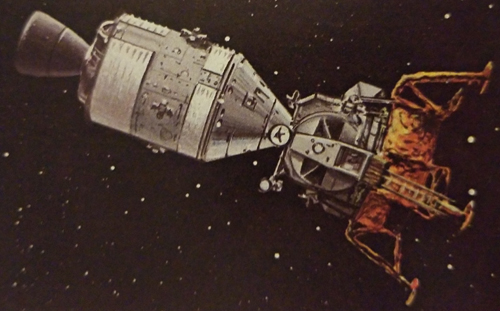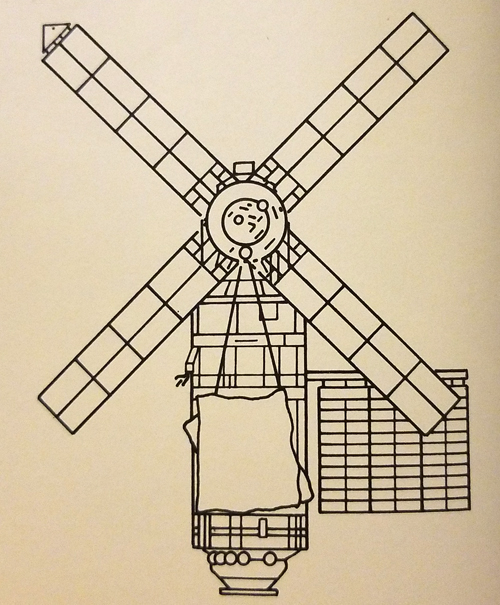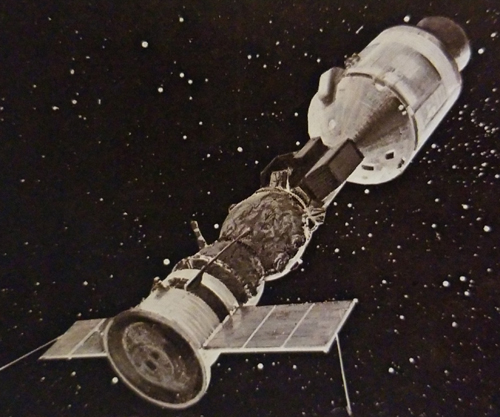Difference between revisions of "1970s (FASA)"
From Trekipedia
m |
m |
||
| (10 intermediate revisions by the same user not shown) | |||
| Line 1: | Line 1: | ||
| − | {| | + | {{ChronologyLinks|chron=FASA|year1=1960s|year2=1980s}} |
| − | | | + | {{BannerFASA|tl|100%}} |
| − | | | + | <div style="text-align:center;">'''[[Reference Stardate]] -1/7001 through -1/7912'''</div> |
| − | | | ||
| − | |||
| − | |||
| − | <div style="text-align:center;">'''[[ | ||
==1970== | ==1970== | ||
| − | * RSD -1/ | + | {{ImageBox2|boxwidth=250px|file=apollo_11-sfc.jpg|caption=[[Apollo program|''Apollo'' Command Module docked to Lunar Excursion Module]] ([[Star Trek: Spaceflight Chronology (Book)|SFC]])}} |
| + | * '''RSD -1/70:''' Disaster is averted as [[Apollo program#Apollo_13|''Apollo'' 13]], which experiences a power failure en route to the [[Luna (FASA)|moon]], is skillfully swung around the satellite and brought safely back to [[Earth (FASA)|Earth]].<ref name="SFC"/> | ||
| + | * [[hahnium|Hahnium]] (element 105) is discovered in the [[United States of America (FASA)|United States of America]] on [[Earth (FASA)|Earth]].<ref name="MRM"/> | ||
==1971== | ==1971== | ||
| − | * RSD -1/ | + | * '''RSD -1/71:''' [[Apollo program#Apollo_14|''Apollo'' 14]] lands at Fra Mauro on the [[Luna (FASA)|moon]], the destination originally chosen for the ill-fated ''Apollo'' 13.<ref name="SFC"/> |
| − | * RSD -1/ | + | * '''RSD -1/71:''' [[Apollo program#Apollo_15|''Apollo'' 15]] lands in Hadley Rille on the [[Luna (FASA)|moon]].<ref name="SFC"/> |
==1972== | ==1972== | ||
| − | * RSD -1/ | + | * '''RSD -1/72:''' The [[Pioneer series#Pioneer_10|''Pioneer'' 10]] probe is launched.<ref name="SFC"/> |
| − | * RSD -1/ | + | * '''RSD -1/72:''' [[Apollo program#Apollo_16|''Apollo'' 16]] spends more than 71 hours on the [[Luna (FASA)|lunar]] surface.<ref name="SFC"/> |
| − | * RSD -1/ | + | * '''RSD -1/72:''' [[Apollo program#Apollo_17|''Apollo'' 17]] marks the end of [[NASA]]'s manned [[Luna (FASA)|lunar]] missions, spending a record 75 hours on the moon and returning with 113.6kg of lunar material.<ref name="SFC"/> |
==1973== | ==1973== | ||
| − | * RSD -1/ | + | {{ImageBox2|boxwidth=250px|file=skylab-sfc.jpg|caption=[[Skylab]] ([[Star Trek: Spaceflight Chronology (Book)|SFC]])}} |
| − | * RSD -1/ | + | * '''RSD -1/73:''' The [[United States of America (FASA)|United States]] orbits the [[Skylab]] space station and sets records for duration in space. Among the experiments performed is the evaluation of long-term weightlessness on humans. Skylab will remain in orbit until 1979.<ref name="SFC"/> |
| + | * '''RSD -1/73:''' The [[Mariner series#Mariner_10|''Mariner'' 10]] probe is launched.<ref name="SFC"/> | ||
| + | |||
| + | ==1974== | ||
| + | * [[Element 106]] is discovered in the [[Union of Soviet Socialist Republics (FASA)|Soviet Union]] on [[Earth (FASA)|Earth]].<ref name="MRM"/> | ||
==1975== | ==1975== | ||
| − | + | {{ImageBox2|float=left|boxwidth=250px|file=apollo-soyuz-sfc.jpg|caption=[[Apollo program#Apollo 18|''Apollo'' 18]] and [[Soyuz program#Soyuz XIX|''Soyuz'' XIX]] docked ([[Star Trek: Spaceflight Chronology (Book)|SFC]])}} | |
| + | * '''RSD -1/75:''' {{link|FASA|Apollo program|Apollo_18|''Apollo'' 18}} and {{link|FASA|Soyuz program|Soyuz_XIX|''Soyuz'' XIX}} link up in space, culminating two years of cooperation between the {{link|FASA|United States of America||United States}} and the {{link|FASA|Union of Soviet Socialist Republics||Soviet Union}}.<ref name="SFC"/> | ||
| + | * '''RSD -1/75:''' {{link|FASA|Zefram Cochrane}} is born on {{link|FASA|Alpha Centauri}}.<ref name="TOS31"/><ref name="FASA2004A"/> | ||
==1976== | ==1976== | ||
| − | * RSD -1/ | + | * '''RSD -1/76:'' [[Viking series#Viking_1|''Viking'' 1]] soft-lands on [[Mars (FASA)|Mars]] and begins transmitting photographs, climatic measurements, and soil composition data. Designed for 90 days, the lander remains functional for two years.<ref name="SFC"/> |
==1977== | ==1977== | ||
| − | * -1/ | + | * '''RSD -1/77:''' [[Voyager series#Voyager_1|''Voyager'' 1]] and [[Voyager_series#Voyager_2|2]] depart for the outer planets. Following up on the earlier [[Pioneer series|''Pioneer'']] missions, these more sophisticated probes will encounter first [[Jupiter (FASA)|Jupiter]] in 1979, then [[Saturn (FASA)|Saturn]] from 1980-81, eventually flying past [[Uranus (FASA)|Uranus]] in 1985.<ref name="SFC"/> |
| + | * [[colladium (FASA)|Colladium]] (element 114) is discovered in the [[United States of America (FASA)|United States of America]] on [[Earth (FASA)|Earth]].<ref name="MRM"/> | ||
==1978== | ==1978== | ||
| − | * -1/ | + | * '''RSD -1/78:''' Ten probes arrive at [[Venus (FASA)|Venus]] in the largest research assault to date. Among the mysteries to be solved are understanding the atmospheric composition and the internal mass distribution of the planet.<ref name="SFC"/> |
| + | * [[Element 107]] is discovered in the [[Union of Soviet Socialist Republics (FASA)|Soviet Union]] on [[Earth (FASA)|Earth]].<ref name="MRM"/> | ||
| − | + | ==1979== | |
| − | + | * [[Element 108]] is discovered in [[Germany]] on [[Earth (FASA)|Earth]].<ref name="MRM"/> | |
| − | |||
| − | |||
| − | |||
| − | {| | + | {{ChronologyLinks|chron=FASA|year1=1960s|year2=1980s}} |
| − | + | {{References}} | |
| − | + | <references> | |
| − | + | <ref name="TOS31">{{RefTOS31}}</ref> | |
| − | <ref name=" | + | <ref name="MRM">{{RefMRM}}</ref> |
| + | <ref name="SFC">{{RefSFC}}</ref> | ||
| + | <ref name="FASA2004A">{{RefFASA2004A}}</ref> | ||
</references> | </references> | ||
| − | + | [[Category:Chronology]] | |
| + | [[Category:FASA Timeline]] | ||
Latest revision as of 11:28, 30 August 2024
Reference Stardate -1/7001 through -1/7912
1970
- RSD -1/70: Disaster is averted as Apollo 13, which experiences a power failure en route to the moon, is skillfully swung around the satellite and brought safely back to Earth.[1]
- Hahnium (element 105) is discovered in the United States of America on Earth.[2]
1971
- RSD -1/71: Apollo 14 lands at Fra Mauro on the moon, the destination originally chosen for the ill-fated Apollo 13.[1]
- RSD -1/71: Apollo 15 lands in Hadley Rille on the moon.[1]
1972
- RSD -1/72: The Pioneer 10 probe is launched.[1]
- RSD -1/72: Apollo 16 spends more than 71 hours on the lunar surface.[1]
- RSD -1/72: Apollo 17 marks the end of NASA's manned lunar missions, spending a record 75 hours on the moon and returning with 113.6kg of lunar material.[1]
1973
- RSD -1/73: The United States orbits the Skylab space station and sets records for duration in space. Among the experiments performed is the evaluation of long-term weightlessness on humans. Skylab will remain in orbit until 1979.[1]
- RSD -1/73: The Mariner 10 probe is launched.[1]
1974
- Element 106 is discovered in the Soviet Union on Earth.[2]
1975
- RSD -1/75: Apollo 18 and Soyuz XIX link up in space, culminating two years of cooperation between the United States and the Soviet Union.[1]
- RSD -1/75: Zefram Cochrane is born on Alpha Centauri.[3][4]
1976
- 'RSD -1/76: Viking 1 soft-lands on Mars and begins transmitting photographs, climatic measurements, and soil composition data. Designed for 90 days, the lander remains functional for two years.[1]
1977
- RSD -1/77: Voyager 1 and 2 depart for the outer planets. Following up on the earlier Pioneer missions, these more sophisticated probes will encounter first Jupiter in 1979, then Saturn from 1980-81, eventually flying past Uranus in 1985.[1]
- Colladium (element 114) is discovered in the United States of America on Earth.[2]
1978
- RSD -1/78: Ten probes arrive at Venus in the largest research assault to date. Among the mysteries to be solved are understanding the atmospheric composition and the internal mass distribution of the planet.[1]
- Element 107 is discovered in the Soviet Union on Earth.[2]
1979
- Element 108 is discovered in Germany on Earth.[2]
Notes and References
- ↑ 1.00 1.01 1.02 1.03 1.04 1.05 1.06 1.07 1.08 1.09 1.10 1.11 Goldstein, Stan et al (Authors). Spaceflight Chronology. Star Trek. Book. Wallaby Books. 1980.
- ↑ 2.0 2.1 2.2 2.3 2.4 Palestine, Eileen and Geoffrey Mandel (Editors). Star Fleet Medical Reference Manual. Star Trek. Book. Originally published by Star Fleet Productions, Inc.. Ballantine Books. 1977.
- ↑ Roddenberry, Gene (Executive Producer). "Metamorphosis." Star Trek, Season 2, Episode 2. Directed by Ralph Senensky. Written by Gene L. Coon. Desilu Productions, 10 November 1967.
- ↑ Wheeler, Wm. John et al (Authors). Cadet's Orientation Sourcebook. Star Trek: The Role Playing Game. Book 2004A, Second Edition. Cover art by Rowena. Graphics and layout by Dana Knutson and Jordan Weisman. FASA Corporation. 1983.


